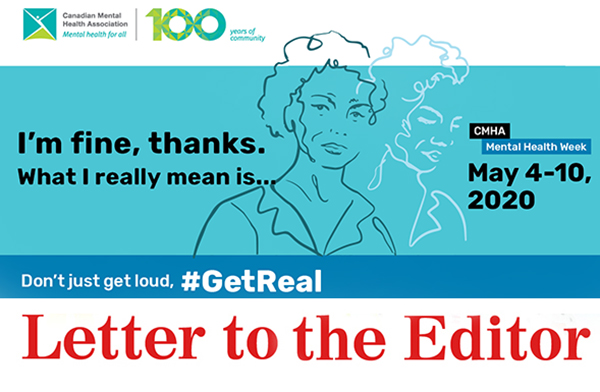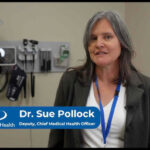Home »

Getting real about mental health
Letter to the Editor
The COVID-19 pandemic has changed almost every aspect of our lives.
Many of us are living with isolation and loneliness, financial worries, the challenges of home-schooling our kids and working from home, and the fear of becoming sick with COVID-19. We’re experiencing increased anxiety, stress and depression – and sometimes grief and loss. And many of the things that traditionally bring us joy have been put on hold.
Simply asking, “How are you doing?” has taken on a much deeper meaning than it did before phrases like “self-isolation” and “physical distancing” came into our lives. We care about one another and are looking out for each other in thoughtful and compassionate ways. Many of us are talking about our individual and collective mental health like never before.
Each year, one in five Canadians will experience a mental health challenge. But in the last few months, that number is much, much higher. A recent Angus Reid survey indicates that half of Canadians say their mental health has declined during the COVID-19 pandemic and 16% describe themselves as depressed.
May 4 to 10, marks Mental Health Week in Canada – a week to celebrate, protect and promote mental health. The theme this year is “social connection,” and it couldn’t be more timely.
This year, during Mental Health Week and beyond, Canadians are being asked to get real about mental health – to tell others how they are really feeling and to reach out for help and connection when they need it. If we take the time to hear what people are really saying when they reply with a simple “fine” or “okay,” we will connect in ways that make a real difference to the well-being of someone who is struggling.
Long before COVID-19 and physical distancing, our government recognized how important it is to expand and strengthen mental health supports in British Columbia. That’s why we launched A Pathway to Hope, B.C.’s roadmap to creating a system of mental health and addictions care that works for everyone. We’ve made big strides when it comes to mental health, including increasing access to low- or no-cost community counselling, expanding the network of Foundry youth centres throughout B.C. and getting started on building child and youth mental health teams in our school districts.
As we face this pandemic, we also know that people who experience social isolation are at increased risk of experiencing stress, anxiety and depression. That’s why we moved quickly to provide $5 million for virtual mental health supports for people around the province, with a focus on our heroic front-line health care workers, unsettled young people and their families, and isolated seniors who are seeking connection and help with day-to-day activities.
These initiatives include BounceBack – a free program for people experiencing low mood, depression or anxiety, Foundry Virtual Clinic for youths aged 12 to 24 and their families, low- and no-cost community counselling available in many languages, and the mobile response team supporting health-care workers on the front lines of two public health emergencies: COVID-19 and the continuing overdose crisis.
These unprecedented times are challenging our mental health. But where there is uncertainty and instability, there is also an opportunity to make lasting change, and to come back better and stronger.
More than ever, people are talking openly and honestly about their mental health – sharing their stories, acknowledging their challenges and reaching out for help. And by talking about our mental health, we are creating the vital connections that will help us through this pandemic and beyond. I encourage everyone to do their part and get real about mental health – because the only way to get through this is together.
And remember, when someone asks you how you are, it’s okay to say, “I’m not okay.”
Judy Darcy,
B.C. Minister of Mental Health and Addictions







